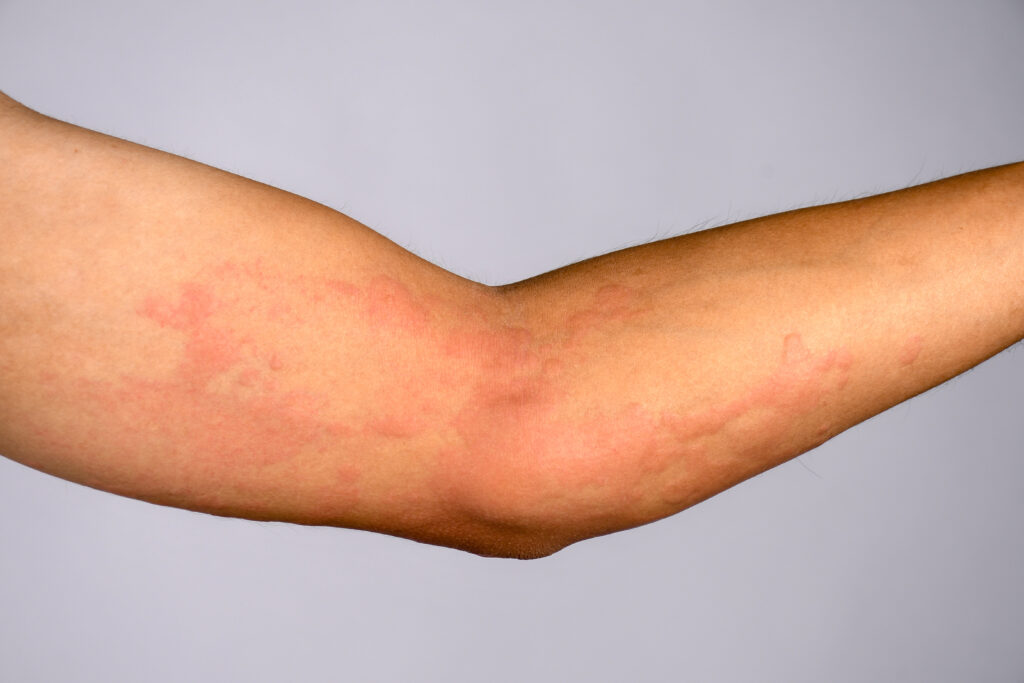Chronic urticaria refers to those pesky, red, itchy welts on your skin that come from seemingly nowhere and stick around for weeks or months. Choosing natural treatments can offer gentle relief without those pesky side effects that medicines might bring. India’s varied climate can influence urticaria symptoms, so understanding how weather changes impact your skin is essential for effective management. Nature-based methods not only reduce reliance on drugs but help you maintain a healthier, holistic lifestyle.
Understanding Chronic Urticaria
Chronic urticaria is when you get swollen, itchy bumps on the skin that last more than six weeks. Common symptoms include red welts, itching, and sometimes a burning sensation. Often, it can be confused with eczema, but the two differ—urticaria vs eczema boils down to how and why the rashes appear.
Urticaria usually has triggers like food allergens, pollen, or even heat, which are not consistent with eczema causes. In India, the diverse climates, from the humid coastal areas to the dry deserts, play a role as triggers of urticaria. Stress and high-pressure lifestyles also contribute by exacerbating symptoms, hence, keeping stress levels down helps in managing the condition.
Natural Urticaria Management Techniques
Finding relief from urticaria symptoms through natural methods can be an empowering journey. Here are some top ways to manage it naturally:
- Dietary Adjustments: Foods can be a trigger of urticaria. Avoid spicy, fried, or processed foods. Instead, try adding antihistamine-rich foods like apples, broccoli, and turmeric. These can help in reducing outbreaks.
- Hydration & Skin Care: Staying hydrated is key, especially during those dry months. Using a gentle, natural moisturizer can keep your skin calm. Follow natural skincare rituals like applying aloe vera gel directly from the plant for a cooling effect.
Seasonal Considerations for Urticaria Management in India
Each season in India presents unique challenges for those managing urticaria.
Winter: The air is cold and dry. Using a humidifier indoors can prevent the skin from becoming parched, and regularly moisturize your skin to maintain a healthy barrier.
Summer: Heat can cause urticaria symptoms to flare. Wear loose, breathable clothes and stay in shaded areas. Yogurts and cucumbers in your diet may also help cool you down internally.
Monsoon: While rain can be comforting, the high humidity and dampness can lead to mold growth, another trigger of urticaria. Ensure you keep living spaces dry and opt for mold-resistant plants indoors to improve air quality.
Lifestyle Modifications for Optimal Management
Managing chronic urticaria involves integrating calming practices into your daily life. Stress reduction is crucial—you can try yoga and meditation routines that target relaxation, helping soothe your body and mind. These activities can be adapted for both busy city dwellers and those in quieter, rural areas, making them flexible and effective.
Consulting Healthcare Professionals
While natural methods are fantastic, they work best when combined with professional advice. Health professionals can guide you on when certain measures are necessary, ensuring that your urticaria treatment plan remains effective. They help navigate when advanced medical interventions become necessary, providing a well-rounded care approach.
Conclusion
In summary, understanding the triggers of urticaria and employing suitable natural strategies can offer significant relief across India’s varied climates.
Consistent personal care, attention to diet, hydration, empower individuals to manage their conditions effectively throughout the year.
